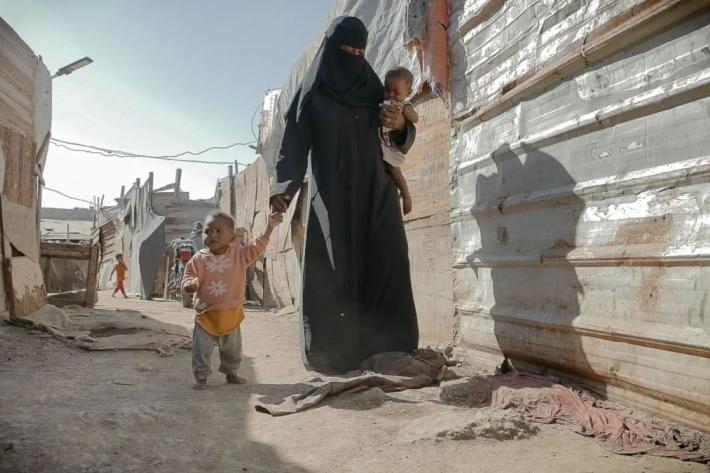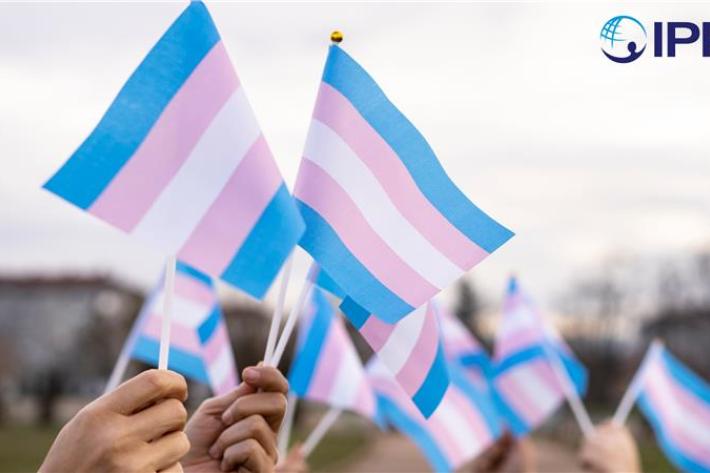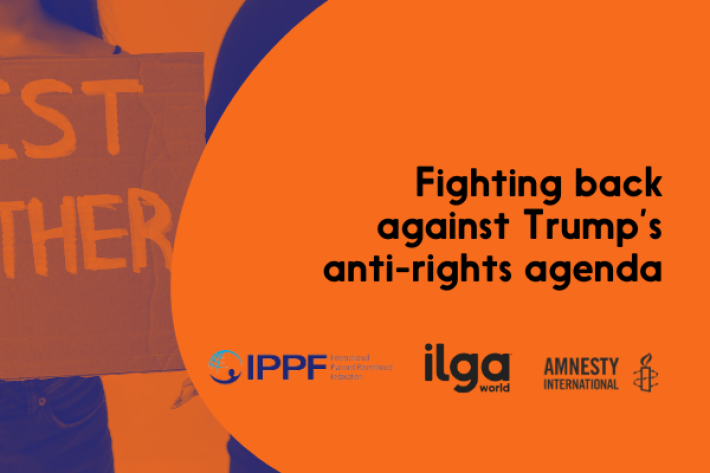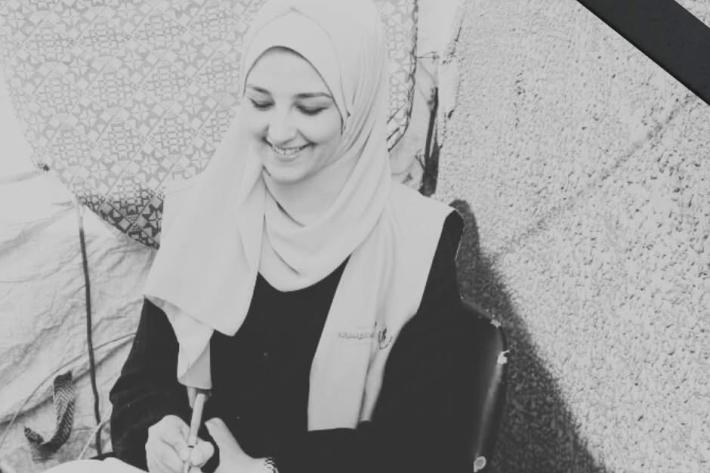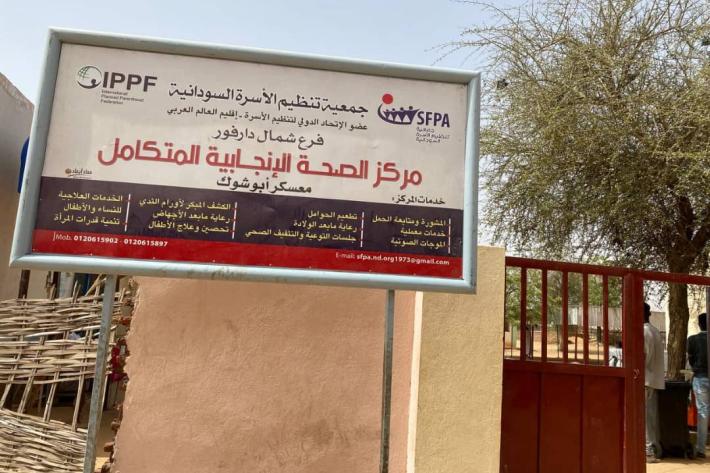
Spotlight
A selection of news from across the Federation

IPPF announces the launch of the call for applications for the post of Director General
The Director-General will play a crucial role in shaping IPPF’s strategic and operational direction, ensuring strong governance, transparency, inclusion, and collaboration.
Filter our news by:


| 04 March 2025
IPPF Welcomes Kavita N. Ramdas as Senior Strategic Advisor
IPPF is delighted to announce that Kavita N Ramdas has joined IPPF as Senior Strategic Advisor. Kavita’s leadership and expertise will be instrumental in advancing IPPF’s Strategy 2028, strengthening our engagement with US-based partners at a critical moment for gender rights movements. As challenges to sexual, reproductive and gender rights intensify, her vision and experience will help drive meaningful change and amplify our impact globally. A globally recognized advocate for gender equity and justice, Kavita was named a Richard von Weisäcker Fellow of the Robert Bosch Academy, in Berlin in 2024 working on the adoption of feminist foreign policy in Germany and other European countries and its impact on domestic politics as well as engagement with the rest of the world. Kavita was previously an Activist in Residence at the Global Fund for Women and was a visiting professor at Princeton University’s School of Public and International Affairs. She has held key leadership positions, including Director of the Women’s Rights Program at the Open Society Foundations and Strategy Advisor at MADRE. Previously, she was President and CEO of the Global Fund for Women and Senior Advisor on Global Strategy to the President of the Ford Foundation, where she also served as the Foundation’s Representative for South Asia. Kavita has also been on the Board of the Planned Parenthood Global. Kavita N Ramdas said: "I am delighted to be in solidarity with and service to the global IPPF family at a time when the world faces a vicious backlash against women's rights, feminist movements, and gender justice. This is an organization with the courage, clarity, and commitment to stand firm in its vision of a more just, inclusive, and sustainable future for all." Mina Barling, IPPF External Relations Director said: “We are thrilled to welcome Kavita to IPPF during such a tumultuous moment where attacks against our dignities, rights and freedoms have escalated with such brutalising force. Kavita’s lifelong commitment to gender justice, her experience in advancing women’s rights in all their diversity are a signal of IPPF’s unwavering resistance, and our steadfast commitment to sexual and reproductive health, rights and justice for ALL."

| 26 February 2025
IPPF announces the launch of the call for applications for the post of Director General
26 February 2025: IPPF is now accepting applications for the position of Director General (DG), as part of a planned leadership transition. In line with IPPF’s bylaws, the current DG, Dr Alvaro Bermejo, will complete his term in early 2026, having served the maximum tenure of two four-year terms. This process ensures continuity while building on his strong leadership. The recruitment is being managed by executive search firm Perrett Laver, working closely with the Board and consulting key stakeholders, including Member Associations and Regional Directors. As a global organisation committed to sexual and reproductive health, rights, and justice, IPPF—comprising 153 Member Associations—champions resilience, progress, and universal access to sexual and reproductive healthcare. A key figure in leading IPPF through its next chapter, the DG will play a crucial role in shaping IPPF’s strategic and operational direction, ensuring strong governance, transparency, inclusion, and collaboration. For full details and job description are here. Applications close at midnight (GMT) on 23 March 2025.

| 24 February 2025
IPPF Statement on the Passing of Dr Hernán Sanhueza
We are deeply saddened by the passing of Dr Hernán Sanhueza, a dedicated leader in the global fight for sexual and reproductive health and rights. Hernán served as Regional Director of IPPF’s Western Hemisphere Region (IPPF-WHR), following in the footsteps of Dr Benjamin Viel. His leadership was marked by an unwavering commitment to advancing family planning and reproductive healthcare across Latin America and the Caribbean. Born in Santiago, Chile, in 1935, Hernán earned his medical degree in 1961 before completing an MSc in Medical Demography at the London School of Hygiene & Tropical Medicine in 1971. He later migrated to the United States, where he became Medical Director of IPPF-WHR in 1972. By 1978, he had stepped into the role of Regional Director, overseeing a rapid expansion of family planning programmes that transformed access to reproductive healthcare across the region. Hernán’s deep understanding of the political landscape and his strategic leadership helped strengthen IPPF’s partnerships and ensure that family planning remained a priority despite growing opposition. His tenure came to an end in 2002, following the devastating impact of President George W. Bush’s reinstatement of the Global Gag Rule—a policy that forced many reproductive health organisations, including IPPF, to make impossible choices. Hernán’s legacy is one of resilience, progress, and an unwavering belief in the right of all people to access reproductive healthcare. We honour his contributions and extend our deepest condolences to his family, friends, and colleagues.

| 11 February 2025
The Government of Japan awards USD1.65 million to IPPF to support communities affected by crises in Afghanistan, Lebanon, and Yemen.
With support from the FY2024 Supplementary Budget received from the Government of Japan, the International Planned Parenthood Federation (IPPF) Member Associations will initiate humanitarian activities in three countries, namely Afghanistan, Lebanon and Yemen, aimed at protecting the health and lives of vulnerable populations affected by local crises through the community-based provision of sexual and reproductive health and essential health services, including maternal and child health, in the following areas: Afghanistan: Logar and Parwan Provinces Lebanon: Bekaar Valley Yemen: Aden and Amran Governorates All the three projects aim to increase people’s access to sexual and reproductive health and rights (SRHR) and gender-based violence (GBV) related care and information. They also seek to strengthen the capacity of service providers to deliver rights-based, quality, and client-centered services, as well as to empower peer educators and community members to raise awareness of SRHR and related health issues. By leveraging and expanding local networks, knowledge, human resources and facilities developed through years of grassroots activities in each country, IPPF will expand the impact of its work and create sustainable change in people's lives. The IPPF Director General, Dr Alvaro Bemejo, said, "We sincerely appreciate the support of the Government of Japan at this time of great concern for the future of global peace, health and well-being. . While Afghanistan, Lebanon and Yemen face their own unique challenges, our community-based Member Associations will maximise the use of this valuable funding received from Japan to work to protect the health, well-being and lives of vulnerable populations affected by crises. In doing so, we will contribute to the realisation of human security so that people can live with dignity, free from ill health and the fear of violence." By the end of February 2026, IPPF, through its local Member Associations, aims to deliver health services to 83,595 people and train 222 health service providers and peer educators across the three countries. For further information, please contact Hanna Lund Adcock (in English, at [email protected]) and Yuri Taniguchi (in Japanese, at [email protected]).

| 30 January 2025
IPPF, ILGA World, and Amnesty International: Fighting Back Against Trump Administration's Anti-Rights Agenda
The new President of the United States is now unveiling his plan to dismantle progress and implement a violent and discriminatory society, all of which have been designed to reverse human rights wins. Between 20 and 29 January, 2025, Donald Trump announced a series of presidential actions, aimed at scaling up attacks toward every individual's right to decide over their own body, identity, and life. The plan of the Trump administration was detailed in the "Project 2025": A society where women lose their rights and freedoms and are reduced to reproductive and domestic labour; A society where the existence of trans and intersex individuals is denied, and their rights are trampled upon; A society where lesbian, gay, and bisexual individuals are forbidden from the choice to have a family - or not - and live freely in their emotional, sexual and relational lives. We have learnt from years of denouncing and refusing the conditions of the Global Gag Rule, that executive orders expand over political cycles, and we can’t rely on a change in government to wind back the clock. The introduction of the Foreign Aid Executive Order, the Defending Women From Gender Ideology Extremism And Restoring Biological Truth To The Federal Government, and the Reevaluating And Realigning United States Foreign Aid reveal a new level of complexity designed to chill the funding landscape and promote violence against those most discriminated and marginalized. This vision, driven by far-right ideologies, will accelerate gender-based, sexual, and LGBTQI+phobic violence, result in more deaths and restrict long taken for granted human rights. This deadly project is not unique to the American far-right. We see it spreading across the world. We have seen both right-wing and left-wing governments gradually incorporating far-right narratives by denying the rights of trans individuals, migrants, and women. A culture of fear and silence has translated into collusion and complicity. We will stand up and speak out for sexual and reproductive health, rights and justice for ALL. Trans people, women, refugees, and migrants are not the threat. Two consecutive administrations who militarised aid and development followed by the Trump Administrations attacks on identity make the US political establishment the real threat to global peace and progress. Let’s cut through the rhetoric and name the Trump Administration's actions for what they are: Attacking the rights of trans and intersex individuals is attacking women’s rights. Deporting migrants leads to misery and death for at risk or targeted populations. Forcibly transferring incarcerated trans women to men’s prisons amounts to risking their lives Cutting funding to the World Health Organization, UNFPA and others makes us vulnerable to pandemics, and cuts off healthcare to everyone, including Americans. Blocking funding for sexual and reproductive health organizations increases the amount of abortions, but makes them less safe, resulting in pregnant people dying. Denying trans adolescents access to healthcare leaves children to suffer, more than 1.8 million LGBTQ+ young people (ages 13-24) seriously consider suicide each year in the U.S. — and at least one attempts suicide every 45 seconds. Increasing militarization and occupation results in more attacks against health care workers and the destruction of service sites makes progress impossible. Withdrawing from the Paris Agreement contributes to an increase in natural disasters and humanitarian crises, where most unsafe abortions happen. The far-right’s program leads to the death of women, LGBTQI+ individuals, migrants, the poor, and other oppressed groups. To combat this destructive societal vision, our organizations call for the unity of progressive movements: We urge governments to stop enabling anti-rights narratives: let women, trans, intersex and non-binary individuals, and migrants live with dignity. Respect our human rights. Defend our human rights. Condemn governments that attack us. We welcome political and climate refugees. We call on feminist organizations, defenders of sexual rights, LGBTQI+ advocates, environmentalists, and ALL human rights defenders: build bridges between our struggles. Keep showing up as part of the wider liberation struggle. To organizations with privileged access to places of power like us: use this privilege to amplify the struggles of those absent from the negotiation table. Elevate the voice of the people who are directly targeted. To keep fighting for the end of colonisation and occupation. We speak out against the militarization of our health service scopes, and the killing of health care workers and patients. Finally, to individuals and activists who follow us, who defend our causes, who demonstrate, share our messages on social media, and support us financially: thank you. You are not alone. Join us. Let’s come together and fight back and win.
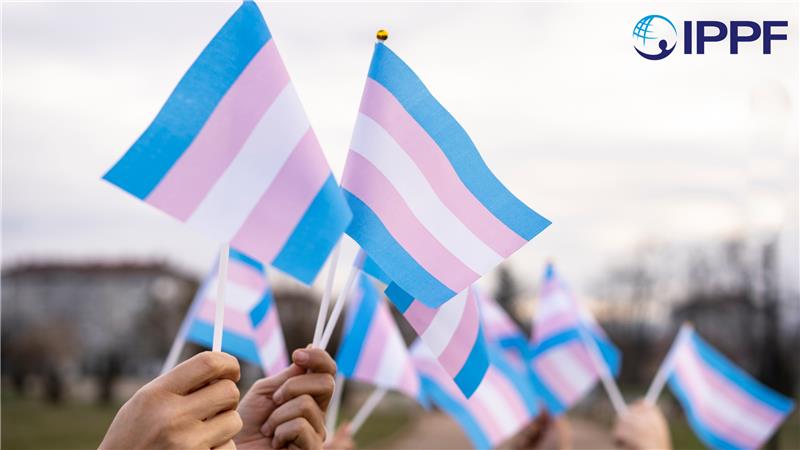
| 30 January 2025
Harmful and stigmatising: Trump signs an order restricting gender-affirming care for minors
Since his inauguration, Donald Trump has conducted a vicious and calculated assault on trans and nonbinary people. Whilst not yet concluded, his attacks include a suite of executive actions designed to humiliate, demonise and erase trans and non-binary people from public life, and include the targeting of children and young people. Some of the actions include the denial of gender-affirming care for minors and the denial of comprehensive sex and relationships education for students. This will increase the rate of violence against, and suicide in young people, and is nothing short of an act of state violence. “Trans children and young people deserve safety, access to the same standard of care afforded to their peers, and adults around them who have their best interest at heart listening to their needs," said Micah Grzywnowicz, Regional Director, IPPF European Network. "No young person, regardless of who they are, should be used as a pawn in a political game. The consequences of this Executive Order will be devastating and long-lasting. For many, access to gender affirming care is a lifeline - we will soon see increasing risks of mental health struggles, including anxiety, depression, and in the worst-case scenario, suicidal tendencies. This must be taken off the books - immediately,” The attacks against children and young people are linked to a full-scale ideological war against all LGBTQI people denying them access to health care and meaningful employment. The anti-gender executive action positions women as needing protection - not from the Trump Administration - but from trans people; and the dog whistling against sexually and gender diverse military personnel is not only bizarre, but signals a new era of toxic masculinity in an increasingly militarised world. Shifting the narrative from marginalization to outright criminalization is dangerous. It is extremist. It is inhumane. The Trump administration’s rollback of HIV/AIDS funding and potential cuts to PEPFAR will have devastating consequences — especially for transgender people, some of whom are engaged in sex work due to systemic discrimination. These cuts will directly impact access to life-saving medication, prevention programs, and healthcare. LGBTQI+ people rely on access to sexual and reproductive healthcare, the reinstatement of the global gag rule and the new foreign aid executive action further denies health care to LGBTQI+ people. By stripping away these vital services, Trump is jeopardising years of global health progress. And it is not just happening in the United States. Across the world, IPPF and its Member Associations are mobilized to expose these strategies used by political parties and governments spreading trans and homophobic ideologies. Many far-right governments use the same playbook—using transphobia as a political weapon to divide the women’s movement, and putting at risk years of child protection efforts designed to safeguard children from harm: in the house, by the church and from the state. As part of the women’s movement we resist the patriarchy, we stand with lesbian, gay, queer, trans and non-binary people who are part of our movement. We are family. We will fight for the rights of our children and young people in all their beautiful diversity. We stand with trans and non-binary people everywhere. For more information on gender-affirming care, read our IMAP Statement here: IMAP Statement on Hormone Therapy for Transgender and Gender Diverse Persons | IPPF You can also read our blog on Self-care tips for when you are receiving gender-affirming healthcare here: Self-care tips for when you are receiving gender-affirming healthcare | IPPF

| 25 January 2025
Our Statement on the Reinstatement of the Global Gag Rule
On 24 January 2025, President Trump signed an executive order reinstating the Global Gag Rule (GGR). The International Planned Parenthood Federation (IPPF) - a federation of members and partners in 153 countries - fights for the right of every individual to decide about their own health, well-being and life. IPPF will never support policies which actively restrict or violate an individual’s right to bodily autonomy, including the right to safe abortion. The GGR - also known as the Mexico City Policy - violates human rights by forcing women to continue with an unwanted pregnancy or into unsafe abortion, and IPPF will not tolerate it. The GGR is a far-reaching, destructive American foreign policy, one that is deeply unpopular with the American people. It denies U.S. funding to organisations like IPPF if they use money from other donors to provide safe abortion services, counselling or referrals. It blocks critical funding for health services like contraception, maternal health, abortion care, and HIV/AIDS prevention and treatment for organisations that refuse to sign it. When it has been enacted by previous Republican Presidents, evidence has shown that the GGR has led to an increase in maternal deaths, in unplanned pregnancies and unsafe abortions. It blocks access to health care for women and the most vulnerable people, silences SRHR advocates, reduces coverage of community health workers, and infringes on a country’s sovereignty. The Global Gag Rule’s reinstatement will result in an escalation in avoidable health crises, needless physical and emotional harm, a loss of dignity for women, and death. IPPF anticipates it will lose $61 million USD for programs that provide sexual and reproductive health services for millions of women and youth. 13 countries and 16 healthcare projects worldwide are affected by the Global Gag Rule. Without funding, the people we serve will otherwise go without these vital services, including women suffering the burden of health and humanitarian crises. Donald Makwakwa, Executive Director, Family Planning Association of Malawi (FPAM): "The reinstatement of the global gag rule will have devastating consequences for women and girls in Malawi, where access to sexual and reproductive health services is already limited. Projected funding cuts to FPAM will disproportionately harm women and young girls in Malawi, many of whom rely on these services to avoid unplanned pregnancies, unsafe abortions, and maternal deaths. It is a cruel policy that sacrifices lives and bodily autonomy." The global gag is further insult to injury on top of other U.S. foreign policies that have a catastrophic impact on the communities in which our MAs work. Just yesterday, the State Department’s Office of Foreign Assistance sent a global cable that ordered an immediate pause on new foreign aid spending, as well as a stop-work order for existing grants and contracts. The new executive action targeting transgender, non-binary and intersex individuals has resulted in great fear for our communities. We have already seen funding cut as a result of its new anti-DEI executive action. The US also announced it plans to renew its membership of the Geneva Consensus Declaration, an anti-abortion joint statement initially cosponsored by persons claiming to represent the governments of Brazil, Egypt, Hungary, Indonesia, Uganda, and the United States. It was signed by persons from 34 countries on October 22, 2020. It is clear foreign aid has become a political weapon, used to enforce hateful ideologies at the expense of women in all their diversity, and against LGBTQI+, poor and immigrant communities. We cannot—and will not—deny life-saving services to the people we serve. We urge other governments and donors to step forward and call out the damage and destruction of these destructive actions. We stand in solidarity with our community. Now is the time for our movement to unite, to come together and to fight for a world of sexual and reproductive health, rights and justice for ALL. Learn more about Global Gag Rule here: The Global Gag Rule | IPPF For more information, please contact [email protected] or +44 7918 845 944. About the International Planned Parenthood Federation IPPF is a global healthcare provider and a leading advocate of sexual and reproductive health and rights (SRHR) for all. Led by a courageous and determined group of women, IPPF was founded in 1952 at the Third International Planned Parenthood Conference. Today, we are a movement of 158 Member Associations and Collaborative Partners with a presence in over 153 countries. Our work is wide-ranging, including comprehensive sex education, provision of contraceptive, safe abortion, and maternal care and responding to humanitarian crises. We pride ourselves on being local through our members and global through our network. At the heart of our mission is the provision of – and advocacy in support of – integrated healthcare to anyone who needs it regardless of race, gender, sex, income, and crucially no matter how remote.
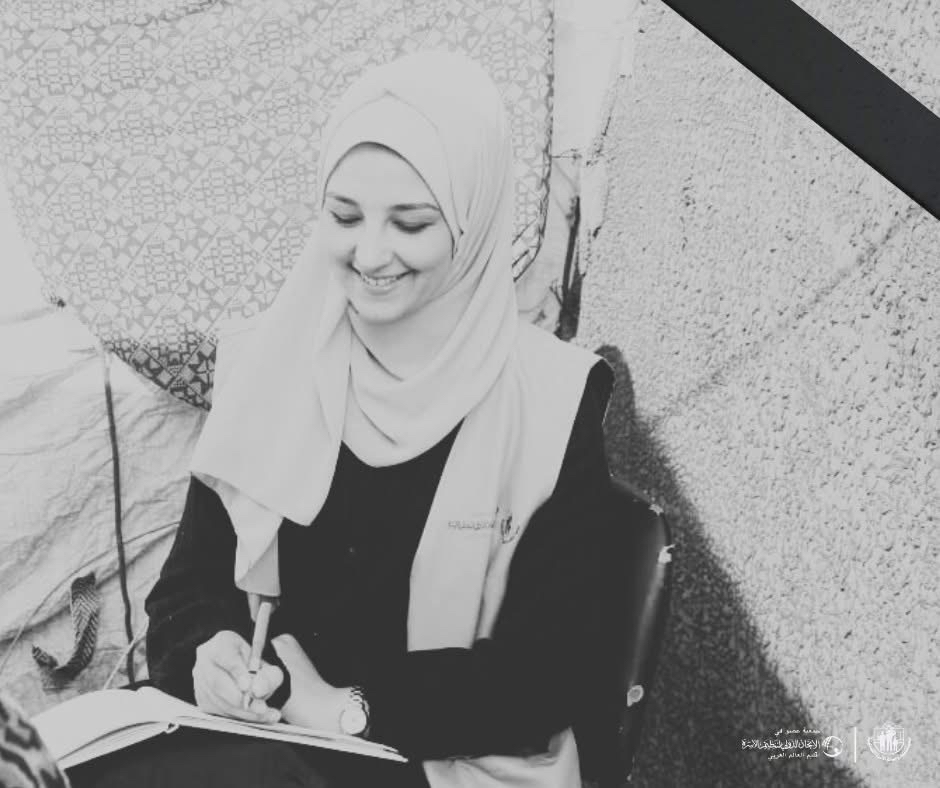
| 07 January 2025
Another health care provider killed by the Israeli army; how many more to go?
It is with deep despair and outrage that we announced yesterday the killing of Dr Thabat Salim. Dr Salim was a 30 year old woman who had only recently begun her career with the Palestinian Family Planning and Protection Association (PFPPA), a Member Association of the International Planned Parenthood Federation (IPPF), but who had become a much loved and respected member of our team. Her death is more than a tragedy; it is a devastating indictment of the conditions under which women health care providers live and work. She was Palestinian. She was living in Gaza. She was a woman of reproductive age. She was a doctor. She worked in a hospital. She cared for Palestine’s next generation; newborn babies. These factors should have made her a symbol of hope and healing. Instead, they culminated in her murder. No woman should be afraid to go to work. Yet, this is the daily reality for many of our healthcare workers — most of them women — in Palestine, Lebanon, Sudan, Syria, Yemen and beyond. Since October 8, 2023, when our health site in Gaza was destroyed, and our staff forced to flee, we have spoken out. We have joined others in echoing #HealthcareWorkersAreNotATarget. But we must also confront a truth that is far more uncomfortable for me to say, and you to read: The Israeli Government is not acting alone in its targeting and killing of women and healthcare workers. The US government - of which we are a recipient of their aid - supplied more than $18 billion in military aid last year. Under the current Administration, they pledged $8 billion more. These funds, meant for military support, translate into more murdered doctors, and many more murdered women and children. They translate to more men killed, injured or incarcerated, and more families shattered. I can of course speak to other Western powers, but as I write this, the U.S. remains one of the biggest suppliers of weapons used in this genocide. Perversely, they are also the biggest funder of global health, including reproductive health programs - programs that will increasingly be designed to “mop up” what remains of our colleagues, patients, clinics and communities. Civilians – and particularly health workers – are being denied their rightful legal protections. For reasons too improbable to untangle here, the United States, and others continuing to supply weapons to the Israeli army, are colluding in the massacre of civilians, colluding in the massacre of Palestinian women of reproductive age, colluding in the massacre of health workers. And in this last act of violence, destroying our humanity. We are urging an end to this violence. An end to the supply of weapons that kill our colleagues and patients. An end to impunity on sexual violence. An end to this genocide. If you stand for women. For peace. For the right to sexual and reproductive health, rights and justice, then stand with us. Stand for Dr Thabat Salim. Stand for the 17 year old who was killed in our Sudanese Family Planning Association clinic in Darfur last week because he dared buy condoms. Stand for our colleagues in Palestine, in Lebanon, in Syria, Sudan and Yemen who have been killed and injured in this last year. Stand for our surviving colleagues on the frontlines of sexual and reproductive healthcare who no longer have a place to go to work, or a place to call home, because in this era of an undeclared war on women’s bodies, on young people’s bodies, a few powerful men felt emboldened enough to consider them collateral damage. It is time to come together, to stand for sexual and reproductive health, rights and justice for ALL. You can stand for IPPF by donating here. All donations will go to where our healthcare workers are providing front line services under conflict.
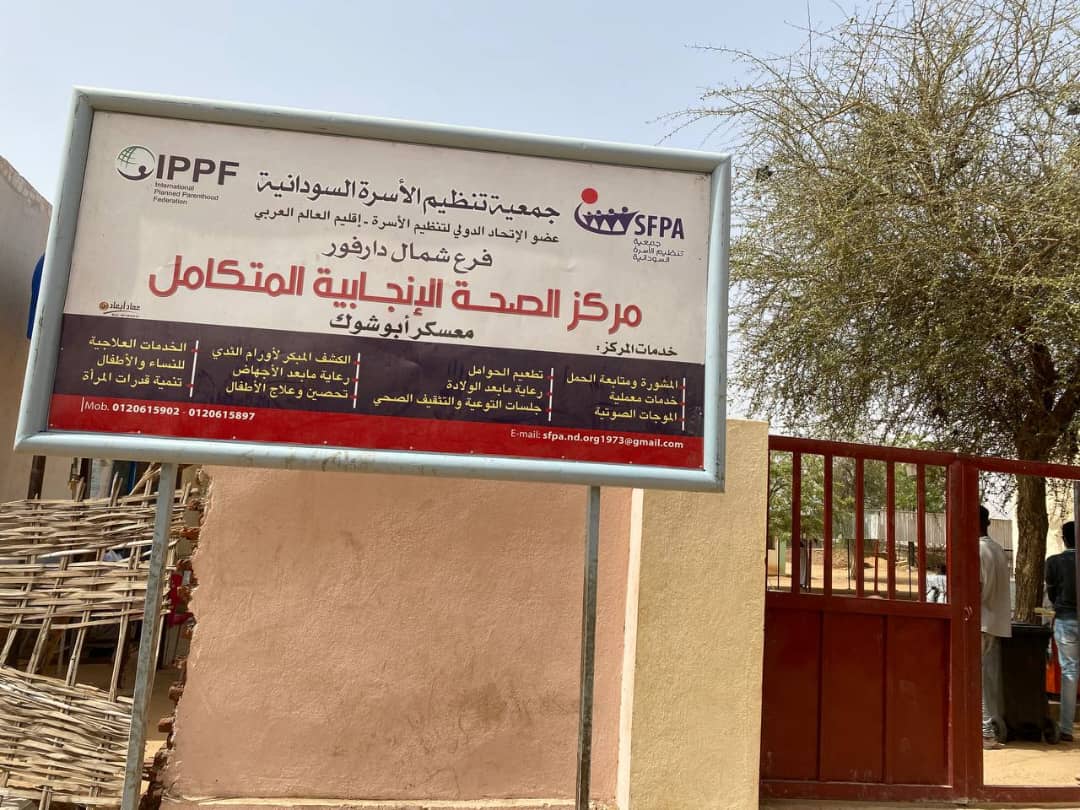
| 02 January 2025
Fatal Attack on Abu Shouk Centre, North Darfur
El Fasher, Sudan: The Abu Shouk Centre, affiliated with the North Darfur State Branch of the Sudan Family Planning Association (SFPA) was directly targeted by the Rapid Support Forces militia on the morning of 28 December 2024. The centre was providing humanitarian services at the time of the attack. This tragic incident resulted in the death of a 17-year-old client and injuries to three others, with varying degrees of severity. The centre’s buildings sustained partial destruction, significantly reducing its ability to deliver essential healthcare and humanitarian services to the local community. This latest attack adds to a series of devastating assaults on our clinics in Sudan. In September 2023, facilities in Khartoum and El Fasher, along with several health centres run by SFPA, were destroyed. On 2 July 2024, another horrendous attack targeted one of our healthcare clinics in Khartoum, further compromising our ability to deliver life-saving services to those in need. The humanitarian crisis in Sudan has reached catastrophic level and is now the world’s largest humanitarian emergency. After nearly 20 months of war, over 12 million people have been displaced from their homes. The country’s healthcare system has collapsed, with an estimated 70–80% of hospitals in conflict-affected areas no longer functioning. Women and girls are experiencing a sharp increase in sexual and conflict-related violence and our staff have witnessed the devastating impact of these crimes on women, girls, and other marginalised groups. SFPA is actively supporting its North Darfur State branch in responding to this urgent situation. We remain committed to the safety and security of our staff and beneficiaries and to continuing the provision of vital family planning and healthcare services to communities in this critically insecure region. Fadoua Bakhadda, Arab World Regional Director for IPPF said, "IPPF AWRO condemns the attack on the Abu Shouk Centre as a heartbreaking reminder of the escalating violence against healthcare providers in Sudan. This assault targets the basic rights of women, girls, and communities relying on life-saving services. We stand in solidarity with SFPA and call on all parties to respect the neutrality of healthcare facilities and prioritize civilian safety and dignity." About the Sudan Family Planning Association The Sudan Family Planning Association (SFPA) was established in 1965 by pioneers in obstetrics and gynaecology in response to increases in maternal, neonatal and infant mortality and morbidity. As the statistics show, Sudan is a country in great need of frontline sexual and reproductive health (SRH) services. Advocacy, and undertaking information, education and communication (IEC) programs are critical. In 2023, SFPA provided 38 million services through 25 clinics, 272 associated clinics, 39 mobile clinics, 1494 CBD/CBS, and digital/Virtual channels. Since the start of the crisis on 15 April 2023, the association teams were successful in providing 8 million services through 25 SDPs and 10 million services through non damaged associated and mobile clinics. SFPA was able to assist 1,183 deliveries under bombardment and provided 170 943 treatments of HIV in its static clinics. About the International Planned Parenthood Federation The International Planned Parenthood Federation (IPPF) is a global healthcare provider and a leading advocate of sexual and reproductive health and rights (SRHR) for all. We are a movement of 150 Member Associations and Collaborative Partners with a presence in over 146 countries. Building on a proud history of 70 years of achievement, we commit to lead a locally owned, globally connected civil society movement that provides and enables services and champions sexual and reproductive health and rights for all, especially the under-served. We advocate for a world where people are provided with the information they need to make informed decisions about their sexual health and bodies. We stand up and fight for sexual and reproductive rights, and against those who seek to deny people their human right to bodily autonomy and freedom. We deliver care that is rooted in rights, respect, and dignity - no matter what.
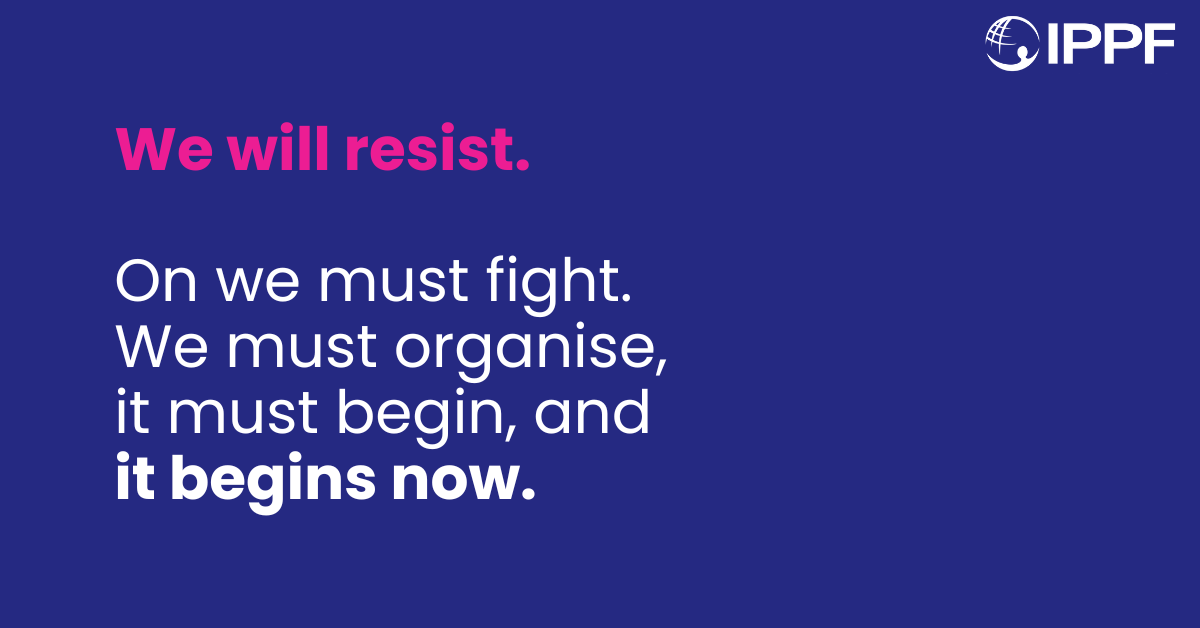
| 07 November 2024
The US Election outcomes are a call to strengthen our movement
Statement by our Director-General, Dr Alvaro Bermejo, on the Trump re-election We woke up to the disturbing news yesterday that Donald Trump is heading back to the White House. As ever, this has come as a huge shock, so firstly, let me express my condolences to all in the United States – and in countries where the U.S. contributes aid - whose reproductive destiny will be forever altered. This is not the news we wanted, nor the result that our Member Association in the United States, PPFA, worked so hard to achieve. We anticipate Donald Trump will sign an executive order almost immediately after inauguration January 20, 2025, to reimpose an expanded Global Gag Rule. As in the past, IPPF will refuse the conditions of the Global Gag Rule. We stand in solidarity with all our Member Associations impacted. Our world has changed, and so we must also acknowledge our MA’s who have been impacted by the horrific attacks on Gaza, on Lebanon, Syria and elsewhere. Over the past year, our teams in Palestine and Lebanon have had their health sites destroyed, and their staff displaced. We will continue to demand sexual and reproductive rights for ALL, no matter where. We will continue to make the links to sexual and reproductive violence where we see it and call out governments who enable it. Our feminist humanitarian response, our new strategy and our commitment to international human rights law makes this a moral imperative. In all this tragedy, comes a glimmer of hope. An opportunity for our movements to reconfigure, to reclaim our space, and bring progressive struggles together. We will resist. This is an invitation to Come Together, to work in solidarity, and to commit to building a liberated future. On we must fight. We must organise, it must begin, and it begins now.









